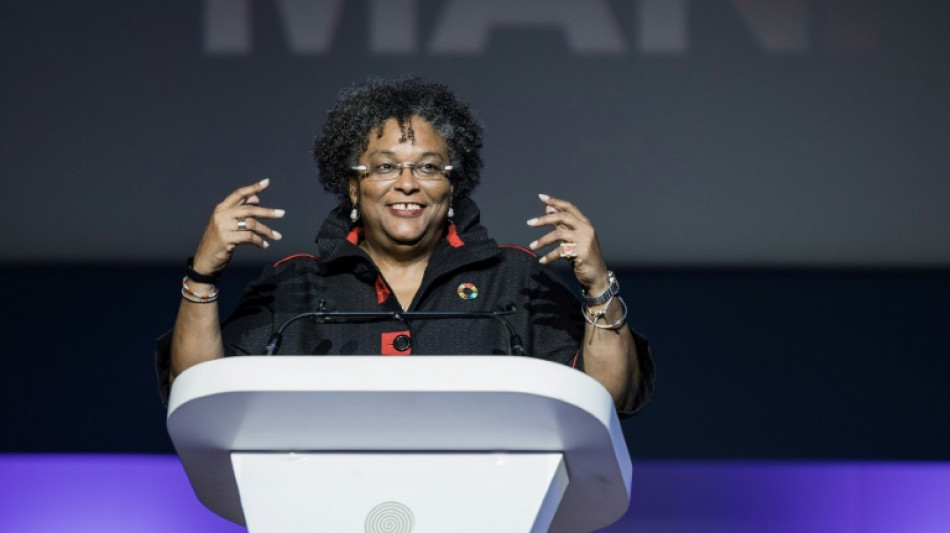
-
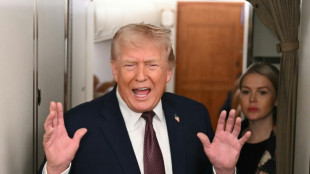 Trump says US will take Greenland 'one way or the other'
Trump says US will take Greenland 'one way or the other'
-
Asian equities, precious metals surge as US Justice Dept targets Fed
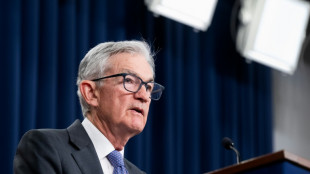
-
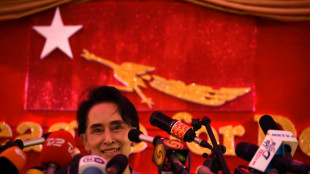 Myanmar pro-military party claims Suu Kyi's seat in junta-run poll
Myanmar pro-military party claims Suu Kyi's seat in junta-run poll
-
Fed chair Powell says targeted by federal probe
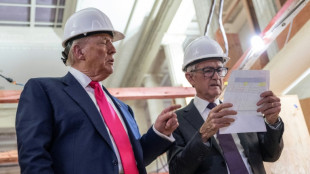
-
 Trailblazing Milos Raonic retires from tennis
Trailblazing Milos Raonic retires from tennis
-
Australia recalls parliament early to pass hate speech, gun laws

-
 'One Battle After Another,' 'Hamnet' triumph at Golden Globes
'One Battle After Another,' 'Hamnet' triumph at Golden Globes
-
Japan aims to dig deep-sea rare earths to reduce China dependence

-
 Top UN court to hear Rohingya genocide case against Myanmar
Top UN court to hear Rohingya genocide case against Myanmar
-
US sends more agents to Minneapolis despite furor over woman's killing

-
 Trump says Iran 'want to negotiate' after reports of hundreds killed in protests
Trump says Iran 'want to negotiate' after reports of hundreds killed in protests
-
Bangladesh's powerful Islamists prepare for elections

-
 NBA-best Thunder beat the Heat as T-Wolves edge Spurs
NBA-best Thunder beat the Heat as T-Wolves edge Spurs
-
Ukraine's Kostyuk defends 'conscious choice' to speak out about war

-
 Trump says working well with Venezuela's new leaders, open to meeting
Trump says working well with Venezuela's new leaders, open to meeting
-
Asian equities edge up, dollar slides as US Fed Reserve subpoenaed

-
 Hong Kong court hears sentencing arguments for Jimmy Lai
Hong Kong court hears sentencing arguments for Jimmy Lai
-
Powell says Federal Reserve subpoenaed by US Justice Department

-
 Chalamet, 'One Battle' among winners at Golden Globes
Chalamet, 'One Battle' among winners at Golden Globes
-
Turning point? Canada's tumultuous relationship with China

-
 Eagles stunned by depleted 49ers, Allen leads Bills fightback
Eagles stunned by depleted 49ers, Allen leads Bills fightback
-
Globes red carpet: chic black, naked dresses and a bit of politics

-
 Maduro's fall raises Venezuelans' hopes for economic bounty
Maduro's fall raises Venezuelans' hopes for economic bounty
-
Golden Globes kick off with 'One Battle' among favorites

-
 Australian Open 'underdog' Medvedev says he will be hard to beat
Australian Open 'underdog' Medvedev says he will be hard to beat
-
In-form Bencic back in top 10 for first time since having baby

-
 Swiatek insists 'everything is fine' after back-to-back defeats
Swiatek insists 'everything is fine' after back-to-back defeats
-
Wildfires spread to 15,000 hectares in Argentine Patagonia

-
 Napoli stay in touch with leaders Inter thanks to talisman McTominay
Napoli stay in touch with leaders Inter thanks to talisman McTominay
-
Meta urges Australia to change teen social media ban

-
 Venezuelans await political prisoners' release after government vow
Venezuelans await political prisoners' release after government vow
-
Lens continue winning streak, Endrick opens Lyon account in French Cup

-
 McTominay double gives Napoli precious point at Serie A leaders Inter
McTominay double gives Napoli precious point at Serie A leaders Inter
-
Trump admin sends more agents to Minneapolis despite furor over woman's killing

-
 Allen magic leads Bills past Jaguars in playoff thriller
Allen magic leads Bills past Jaguars in playoff thriller
-
Barca edge Real Madrid in thrilling Spanish Super Cup final

-
 Malinin spearheads US Olympic figure skating challenge
Malinin spearheads US Olympic figure skating challenge
-
Malinin spearheads US figure Olympic figure skating challenge

-
 Iran rights group warns of 'mass killing', govt calls counter-protests
Iran rights group warns of 'mass killing', govt calls counter-protests
-
'Fragile' Man Utd hit new low with FA Cup exit

-
 Iran rights group warns of 'mass killing' of protesters
Iran rights group warns of 'mass killing' of protesters
-
Demonstrators in London, Paris, Istanbul back Iran protests

-
 Olise sparkles as Bayern fire eight past Wolfsburg
Olise sparkles as Bayern fire eight past Wolfsburg
-
Man Utd knocked out of FA Cup by Brighton, Martinelli hits hat-trick for Arsenal

-
 Troubled Man Utd crash out of FA Cup against Brighton
Troubled Man Utd crash out of FA Cup against Brighton
-
Danish PM says Greenland showdown at 'decisive moment' after new Trump threats

-
 AC Milan snatch late draw at Fiorentina as title rivals Inter face Napoli
AC Milan snatch late draw at Fiorentina as title rivals Inter face Napoli
-
Venezuelans demand political prisoners' release, Maduro 'doing well'

-
 'Avatar: Fire and Ashe' leads in N.America for fourth week
'Avatar: Fire and Ashe' leads in N.America for fourth week
-
Bordeaux-Begles rout Northampton in Champions Cup final rematch


Climate-hit island pushes to reshape World Bank, IMF
While conflict and inflation will dominate World Bank spring meetings next week, campaigners are pushing for a redesign of global financial architecture to help countries cope with climate change.
Experts say developing nations are struggling to find the funds needed to stop burning planet-heating fossil fuels and prepare for tomorrow's climate disasters, as they grapple with rising costs, soaring debts and extreme weather events.
The question is what to do about it, amid international tensions driven by Russia's invasion of Ukraine and trade tussles between the US and China.
Enter Barbados Prime Minister Mia Mottley.
"We believe that we have a plan," the head of the Caribbean island nation, threatened by storms and sea level rise, told world leaders at the COP27 climate summit in Egypt in November.
Known as the Bridgetown Initiative, the ideas she laid out include using the International Monetary Fund to turn "billions to trillions" in investments to cut carbon pollution, as well as a tax on fossil fuel profits to cushion the economic blows of climate impacts.
While the proposals are still being debated, they have gained traction among the large economies that hold sway over the World Bank and IMF, raising hopes of action in the coming months.
The World Bank is under particular pressure, in the wake of the resignation of chief David Malpass amid questions over his stance on climate change.
French President Emmanuel Macron has embraced the reform push and will seek to keep up momentum with a climate finance summit in June, ahead of Bank meetings and UN climate summits later this year.
Reform plans are gaining momentum because they fill a "policy vacuum" over funding for the global climate response, said Avinash Persaud, the economist running the Barbados campaign with "one and a half people and a spreadsheet".
"I feel we've got a moment here," he told AFP.
- 'Burning and drowning' -
United Nations climate science experts have said time is running out to invest in the changes needed to limit warming to 1.5 degrees Celsius above preindustrial temperatures.
Currently the world is far off track, risking enormous costs, for nature, human societies and the global economy.
"Unless money is put on the table, we won't be able to solve the climate crisis," said Harjeet Singh, Head of Global Political Strategy at the Climate Action Network campaign group.
The last few years have seen waves of crop-withering heat waves, droughts and floods in key global breadbaskets.
In Pakistan, for example, the economy was already struggling after years of political upheaval, but a global energy price surge and catastrophic floods last year have pushed it to the brink.
Developing countries are already losing "big chunks" of their gross domestic product each year to climate impacts, said Persaud.
"We are burning up and we are drowning in the same year, that's climate change for you," he said.
- After war -
The so-called Bretton Woods financial architecture was created to help rebuild countries shattered by the Second World War and boost global trade and development.
The world has now reached a new inflection point, said Cameroonian economist Vera Songwe.
"If you combine all these crises we have today, it feels like we just came through a war," she told AFP.
Of those crises, climate change is now "the most critical and the most sustained of risk", she said, adding it is already "permeating every aspect of global economic development".
Financial institutions have started to take action.
The IMF has created a new loan-based Resilience and Sustainability Trust to help poorer or vulnerable countries boost sustainable growth. Barbados was the first recipient.
The World Bank says it delivered a record $31.7 billion last year to help countries tackle climate change and has started to draft a roadmap for change.
But even as wealthy nations have failed to meet their own target of providing $100 billion annually to help developing nations invest in clean energy and boost resilience to climate impacts, research has shown the true costs already far exceed that figure.
Songwe co-led the Independent High-Level Expert Group on Climate Finance, set up under the UN, which last year said they will need over $2 trillion a year by 2030 to respond to the climate crisis.
- 'Change the world?' -
The Barbados plan seeks to raise those trillions using roughly $500 billion in IMF reserve assets -- known as Special Drawing Rights -- as collateral in a new climate trust, which could borrow cheaply to invest in private sector emissions-reduction projects.
It also calls for multilateral development banks to significantly increase their lending, while stressing that debt arrangements should include, as Barbados has, disaster clauses allowing a country to pause repayments for two years after an extreme event.
And the plan calls for taxes -- for example on fossil fuel profits -- to help countries cope with climate losses and damages.
Singh welcomed the proposal, although campaigners want debt cancellation on the table and a greater acknowledgement of responsibility from rich polluters.
Persaud said the hope was to build a broad coalition of countries on the climate frontlines -- roughly 40 percent of the world's population -- to push for change.
"You will change the world for 3.2 billion people, especially because that group is growing," he said.
U.AlSharif--SF-PST



